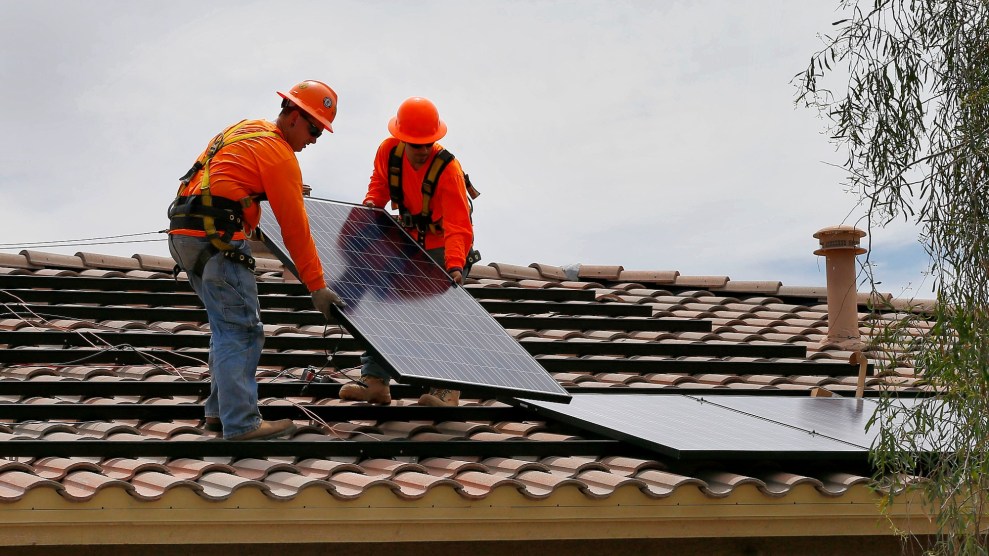British Prime Minister Tony Blair, as President George W.
Bush often reminds us, is a good friend of the U.S. And this
week was time for some friendly criticism of the Bush
administration’s decision to pull out of the Kyoto Treaty.
Blair minced no words about the
disastrous consequences of global warming and the failure of the biggest polluters, such as Russia and (especially) the United States to do their fair share:
“What is now plain is that the emission of
greenhouse gases, associated with industrialization and
strong economic growth from a world population that has
increased sixfold in 200 years, is causing global warming at
a rate that began as significant, has become alarming and is
simply unsustainable in the long-term.
It is the poorest countries in the world that will suffer most from severe weather events, longer and hotter droughts and rising oceans. Yet it is they who have contributed least to the problem. That is why the world’s richest nations in the G8 have a responsibility to lead the way: for the strong nations to better help the weak.”
While Blair’s remarks were widely covered by the British press, they were largely ignored in the United States. In Britain Blair was commended from the left and the right for highlighting the dangers of global warming and urging the U.S. to ratify the Kyoto Treaty, but he was also criticized from both ends of the political spectrum for not doing enough to reduce greenhouse gas emissions in Britain. As the London Guardian noted:
“Good green rhetoric by Labor has been undermined by a failure to solve the growing problems of road transport (not least by abandoning the Conservatives’ fuel duty escalator) and by endorsing airport expansion. Yesterday, Mr Blair said that the minimum standard for the energy performance of new houses was being raised by 25% a year. That is fine—but he did not say whether the benefits would be negated by the huge number of new homes to be built as part of the government’s plans to solve the housing crisis.”
Blair promised to use Britain’s presidency of the G8 meeting next year to push others to comply with the Kyoto targets, which aim for a reduction in greenhouse gas emissions to 1990 levels by 2012. Britain is on track to meet its obligations, but for the Kyoto Treaty to come into effect, developed countries responsible for 55 percent of the greenhouse gas emissions must ratify the treaty. The United States, which accounts for 25 percent of all greenhouse gas emissions, pulled out of the talks under President Bush. The current White House holds the dubious distinction of having compiled the worst environmental record of any modern administration and continues to question the validity of the (overwhelming) scientific evidence on global warming. Bush even refuses to heed the advice of the Pentagon, which recently commissioned a report urging that climate change “should be elevated beyond a scientific debate to a US national security concern.” As MotherJones.com summed up report’s findings:
“Working from a ‘mid-range’ scenario, the authors found that by 2020 a dramatic cooling, by 5 to 6 degrees Farenheit, in the Northern Hemisphere would cause harsher winters, ‘mega-droughts,’ flooding and violent storms, all on an apocalyptic scale, driving ‘waves of boat people’ to from country to country; wars over basic resources such as oil, food, and water would become common; deaths from war and famine would run into the millions until the planet’s population is reduced by such an extent the Earth can cope; rich areas like the US and Europe would become ‘virtual fortresses’ to prevent millions of migrants from entering after being forced from land drowned by sea-level rise or no longer able to grow crops. Concludes the report: ‘Disruption and conflict will be endemic features of life. Once again, warfare would define human life.’ ”
John Kerry has rightly rebuked Bush for abandoning the Kyoto Treaty. Kerry says he is in favor of going back to the negotiating table, but he hasn’t pledged to ratify the treaty either. The U.S., in short, is hardly a glowing example of environmental responsibility for Russia. There, a similar mix of political skepticism of damning scientific evidence and concern over the negative economic ramifications cited by the Bush administration, is threatening to kill Kyoto’s ratification. Blair has pointed out that economic prosperity and environmental responsibility are not mutually exclusive: Britain has made progress towards meeting its Kyoto goals as its economy expanded. Admittedly, Russia and the United States face much bigger challenges than Britain, but as Blair argued:
“We have to recognize that the commitments reflected in the Kyoto protocol and current EU policy are insufficient, uncomfortable as that may be, and start urgently building a consensus based on the latest and best possible science.”
Such mental clarity won’t make itself evident in the U.S., at least not until after November. Neither Kerry, nor Bush is going to risk loosing votes in the swing, coal states like Ohio, Pennsylvania, and West Virginia by seconding Blair. Yet the disastrous consequences of the U.S. climate policy remain, which makes it all the more a shame that Blair’s important speech is not getting the attention it deserves.












